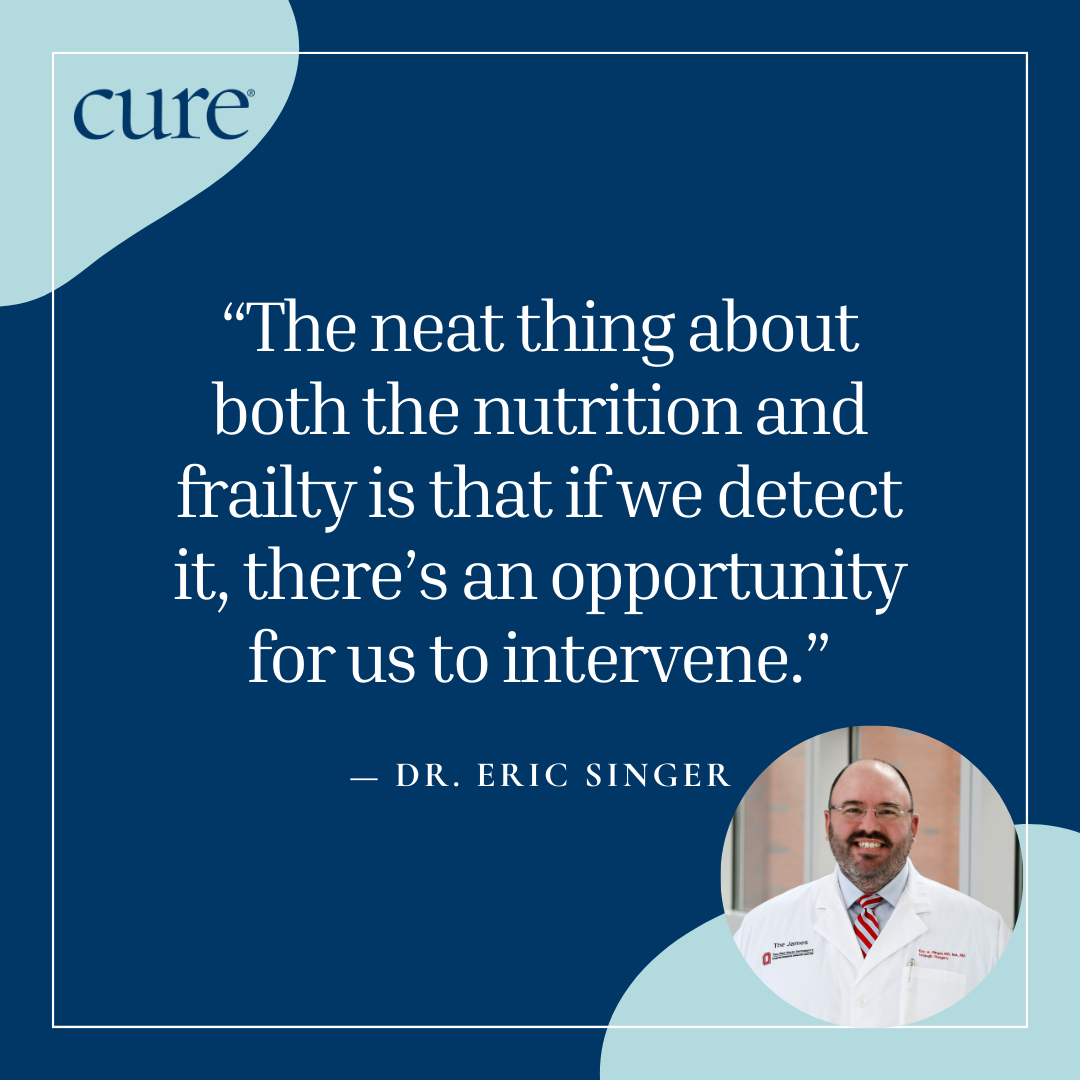News
Article
Navigating Nutrition, Frailty During Kidney or Bladder Cancer Is Key
Considering nutrition and frailty earlier on may help patients achieve better health-related quality of life during kidney cancer and bladder cancer.
It's important for patients with kidney cancer and bladder cancer to be aware of their physical functioning because it plays a crucial role in their health-related quality of life.

Factors such as frailty, nutritional status and the level of performing everyday tasks play a key role in health-related quality of life in patients with bladder or kidney cancer over time, researchers found.
A study recently published in the Journal of Cancer Survivors showed that over time, role functioning (family, work and social roles), emotional functioning and fatigue improved. Specific factors that were associated with having a negatively affected quality of life included malnutrition, pre-frailty and frailty and cancer treatment. Researchers from the study also found that women with bladder or kidney cancer tended to have negatively affected long-term quality of life.
Of note, factors that were most negatively affected health-related quality of life included malnourishment and frailty, the study stated.
Health-related quality of life, as defined by Johns Hopkins Medicine, is the impact on a person’s health and their ability to live their life to its fullest. However, it’s multi-faceted because it includes physical, psychological and social functioning and well-being — both positive and negative.
“There are different surveys or instruments that ask patients about the impact of both the disease and the treatment on different domains of what they usually do. These are important because it's a critical way for the patient voice to enter the picture,” added Dr. Eric A. Singer during an interview with CURE®. “If [treatments are] not helping patients live longer or live better, we have to think very carefully about what we're doing. So, health-related quality of life is a critical way for us to get insight into what's happening in those other domains.”
Singer is a urologic oncologist and chief of the Division of Urologic Oncology at The Ohio State University Comprehensive Cancer Center.
Health-Related Quality of Life Implications With Kidney and Bladder Cancers
For patients with kidney cancer, surgically removing a kidney is the most common treatment, Singer explained. The surgery may change kidney function. In most cases, he emphasized that patients’ kidney functions remain fine following surgery. However, patients whose kidney functions worsen may have to alter their diets and/or take additional medicines, he said.
“Some patients [with kidney cancer] even have to go on hemodialysis (treatment to filter wastes and fluids from the blood because the kidneys no longer function properly) or a kidney replacement therapy, but fortunately this is extremely rare,” Singer added.
Similarly, he noted that patients with bladder cancer also experience symptoms and side effects from treatments and procedures, which can be “very life-altering.” Major surgery, such as a radical cystectomy (removing the entire bladder and nearby lymph nodes), can be disruptive to patients because of urinary and sexual health impacts, Singer explained.
Patients who have advanced or metastatic kidney cancer or bladder cancer also receive systemic therapies (treatment that travels throughout the entire body). However, receiving systemic therapies also “come with a whole list of toxicities and side effects that can go along with them, depending on the type of agent being used,” Singer said.
These particular agents — or therapies — include cytotoxic chemotherapy, immunotherapy, targeted therapies or combinations, he explained.
Nutrition and Frailty Status for Patients With Kidney Cancer and Bladder Cancer
Two factors of health-related quality of life include nutrition and frailty, which are “two critical pieces and are often intertwined,” Singer said.
READ MORE: Food Items Patients With Cancer Should Buy, Items to ‘Put Down’
“When we talk about diet, we’re often concerned about unintentional weight loss — and something called sarcopenia — which is loss of muscle mass and strength,” he explained.
Regarding malnutrition, Singer mentioned that some patients are not interested in eating because of their cancer type or because their medicines cause nausea, vomiting or diarrhea, which leads to nutritional loss.
Importantly, patients’ diets must be tailored appropriately to accommodate other health conditions they may have, Singer emphasized. Many patients with kidney cancer and bladder cancer may also have heart disease or diabetes, so doctors must be mindful of the dietary supplements that patients receive.
For example, if a patient has diabetes, “we can’t have someone taking a dietary supplement that has a lot of sugar in it because that’s going to make their diabetes out of control and that’s going to cause a different problem,” he said.

Frailty is another significant factor in health-related quality of life that is associated with survival outcomes. To assess frailty, some assessments can be done to help identify a person’s gait (how a person naturally walks), their ability to go from sitting to standing and grip strength, Singer explained.
“These are all things to get a sense of how functional patients are before we offer them big surgery or an aggressive systemic therapy,” he said. “The neat thing about both the nutrition and frailty is that if we detect it, there’s an opportunity for us to intervene.
“So, the idea of prehabilitation, getting people seen by nutrition, getting into physical therapy and occupational therapy before surgery or starting systemic therapy to try to bend the curve and get people feeling and performing better prior to treatment.”
For more news on cancer updates, research and education, don’t forget to subscribe to CURE®’s newsletters here.
2 Commerce Drive
Cranbury, NJ 08512
All rights reserved.




